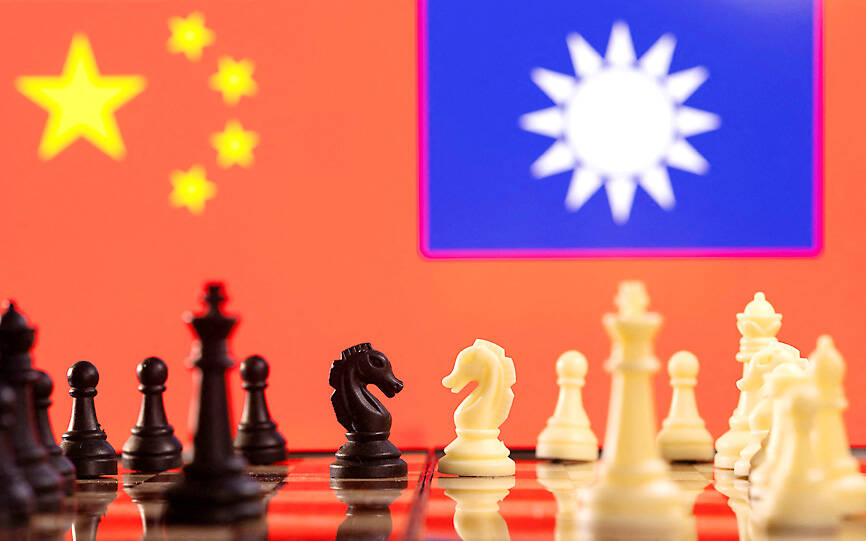China is targeting projects to enhance public spaces in its “united front” tactics, a lawmaker said yesterday after New Taipei City-based cultural conservation group Am Kehnn Cultural Workshop (暗坑文化工作室) said that Beijing has conducted a covert campaign to infiltrate Taiwanese placemaking projects.
Taiwan’s placemaking scene is awash with Chinese money, Am Kehnn Cultural Workshop wrote on Facebook on Thursday, adding that almost every region in the nation was among the winners at a cross-strait construction and creation contest held by China’s Fujian Province.
Beijing’s campaign to fund projects to enhance public spaces poses a greater danger to Taiwan than its support of local temples, as people who run the projects tend to be highly influential members of their communities, the group said.

Photo: Reuters
Chinese infiltration targeting Taiwan’s grassroots efforts to renovate local communities, mainly headed by the Fujian provincial government, appeared to focus on poaching Taiwanese talent, buying the support of local grassroots organizations and spreading pro-China narratives, the group said.
Chinese state-run news Web platform People.cn reported that Fujian has recruited 95 Taiwanese architectural and cultural industry entities and 300 people in related fields to work for the province’s own placemaking initiatives, the group said.
On Friday, the group named dozens of entities that allegedly received funding from Fujian. The list comprised mostly local businesses and education institutions, including Dayeh University in Changhua County and Tunghai University in Taichung.
The group cited information from the cross-strait construction and creation contest and public announcements of the universities’ exchange programs as evidence.
The competition cannot be said to be apolitical, as Article 9 of the event’s governing charter stipulates that placemaking projects that compromise Chinese national secrets or have negative social effects are to be excluded from consideration, it said.
The rule is a veiled reference to prevent projects that express Taiwanese localism from winning, it said.
Its rules also stipulate that the event should be broadly promoted by the media, showing that it was part of Beijng’s so-called “great external propaganda efforts,” Am Kehnn Cultural Workshop said.
Democratic Progressive Party Legislator Wang Ting-yu (王定宇) yesterday said that the targeting of placemaking was a new development in China’s continued “united front” tactics.
By providing financial support, Beijing seeks to build rapport with the nation’s cultural industry, which would be a useful instrument to broaden China’s influence over ordinary people, Wang said.
Beijing’s willingness to spend money on the cultural industry in Taiwan when nearly 300 million rural Chinese are on the poverty line shows that its efforts are intended to undermine Taiwan, he said.

A Ministry of Foreign Affairs official yesterday said that a delegation that visited China for an APEC meeting did not receive any kind of treatment that downgraded Taiwan’s sovereignty. Department of International Organizations Director-General Jonathan Sun (孫儉元) said that he and a group of ministry officials visited Shenzhen, China, to attend the APEC Informal Senior Officials’ Meeting last month. The trip went “smoothly and safely” for all Taiwanese delegates, as the Chinese side arranged the trip in accordance with long-standing practices, Sun said at the ministry’s weekly briefing. The Taiwanese group did not encounter any political suppression, he said. Sun made the remarks when

The Taiwanese passport ranked 33rd in a global listing of passports by convenience this month, rising three places from last month’s ranking, but matching its position in January last year. The Henley Passport Index, an international ranking of passports by the number of designations its holder can travel to without a visa, showed that the Taiwan passport enables holders to travel to 139 countries and territories without a visa. Singapore’s passport was ranked the most powerful with visa-free access to 192 destinations out of 227, according to the index published on Tuesday by UK-based migration investment consultancy firm Henley and Partners. Japan’s and

BROAD AGREEMENT: The two are nearing a trade deal to reduce Taiwan’s tariff to 15% and a commitment for TSMC to build five more fabs, a ‘New York Times’ report said Taiwan and the US have reached a broad consensus on a trade deal, the Executive Yuan’s Office of Trade Negotiations said yesterday, after a report said that Washington is set to reduce Taiwan’s tariff rate to 15 percent. The New York Times on Monday reported that the two nations are nearing a trade deal to reduce Taiwan’s tariff rate to 15 percent and commit Taiwan Semiconductor Manufacturing Co (TSMC, 台積電) to building at least five more facilities in the US. “The agreement, which has been under negotiation for months, is being legally scrubbed and could be announced this month,” the paper said,

MIXED SOURCING: While Taiwan is expanding domestic production, it also sources munitions overseas, as some, like M855 rounds, are cheaper than locally made ones Taiwan and the US plan to jointly produce 155mm artillery shells, as the munition is in high demand due to the Ukraine-Russia war and should be useful in Taiwan’s self-defense, Armaments Bureau Director-General Lieutenant General Lin Wen-hsiang (林文祥) told lawmakers in Taipei yesterday. Lin was responding to questions about Taiwan’s partnership with allies in producing munitions at a meeting of the legislature’s Foreign Affairs and National Defense Committee. Given the intense demand for 155mm artillery shells in Ukraine’s defense against the Russian invasion, and in light of Taiwan’s own defensive needs, Taipei and Washington plan to jointly produce 155mm shells, said Lin,